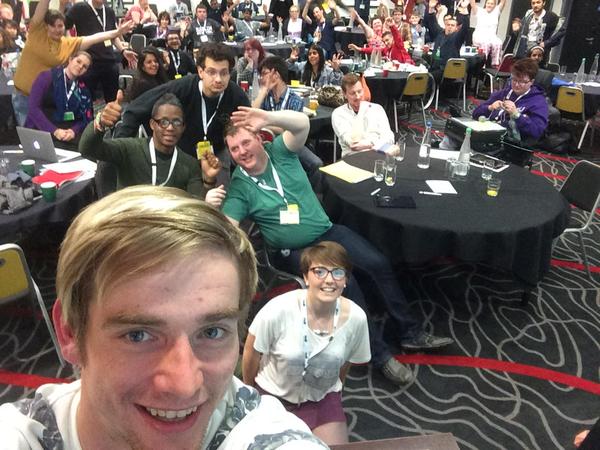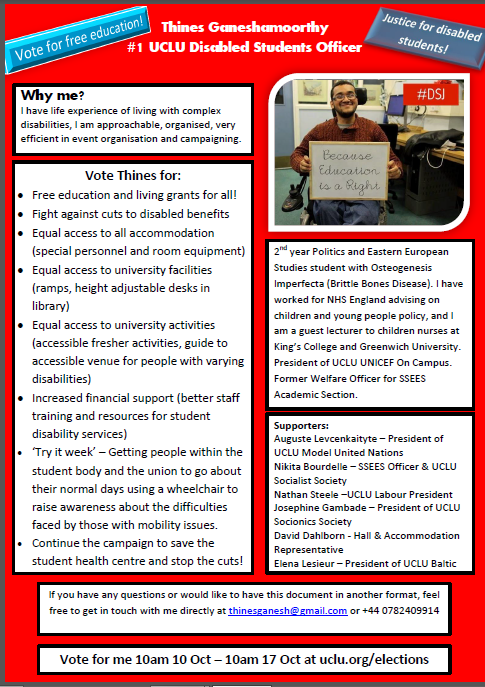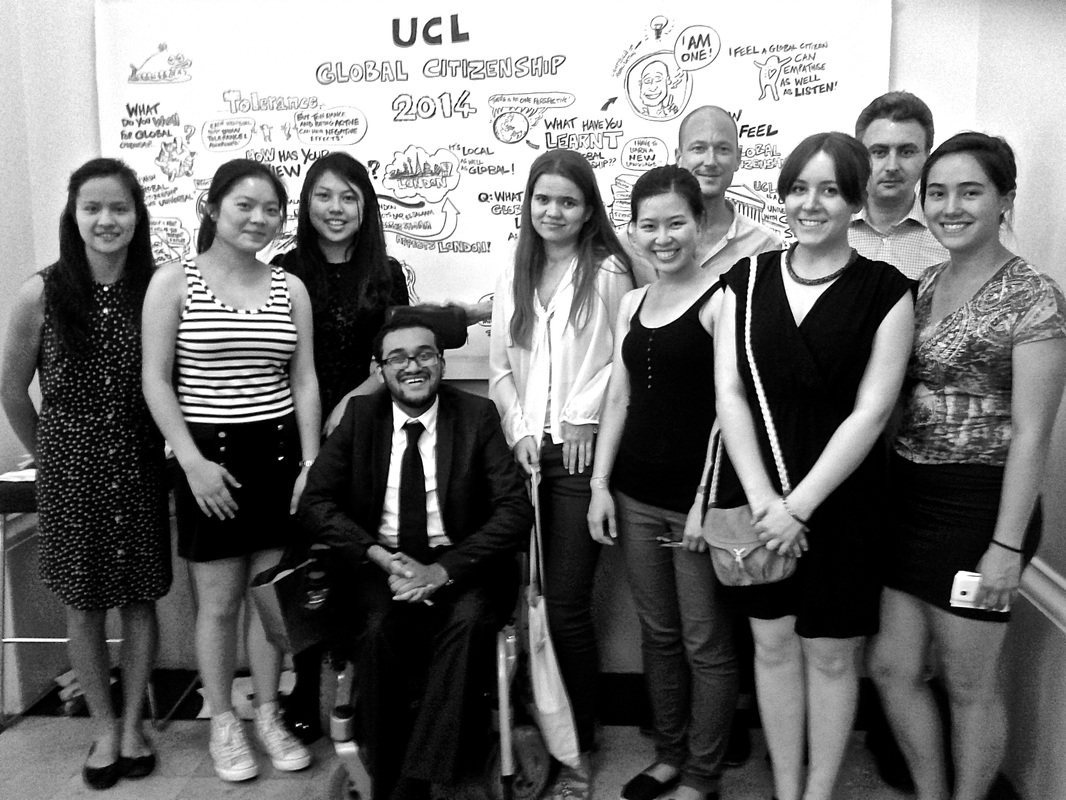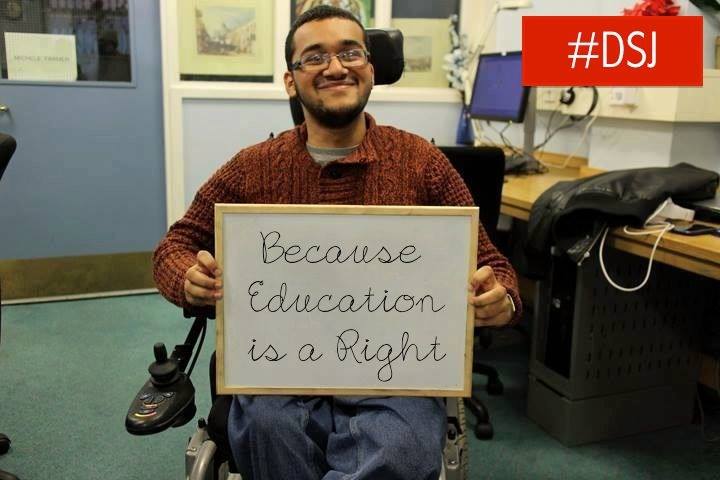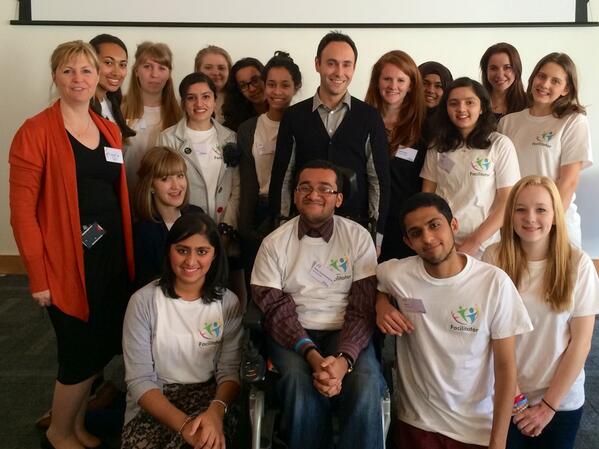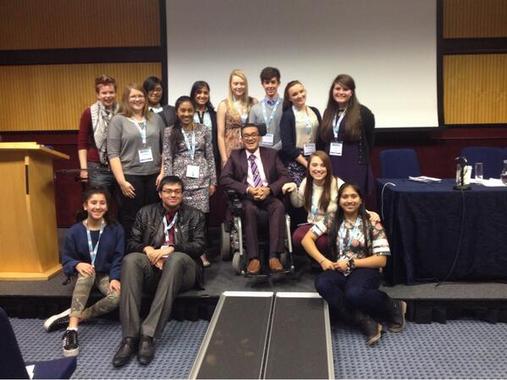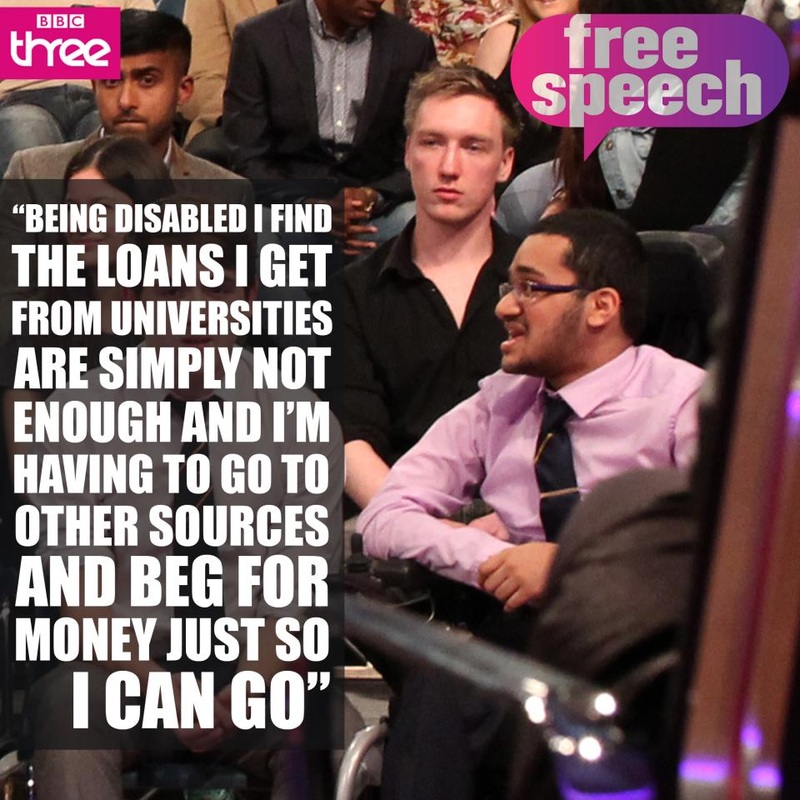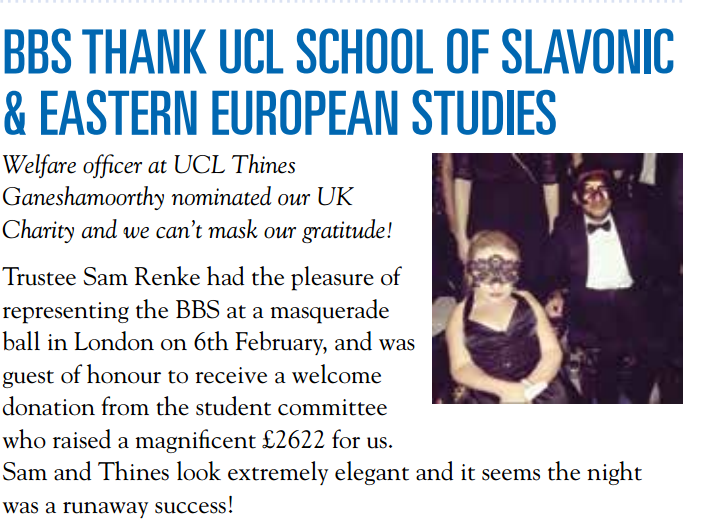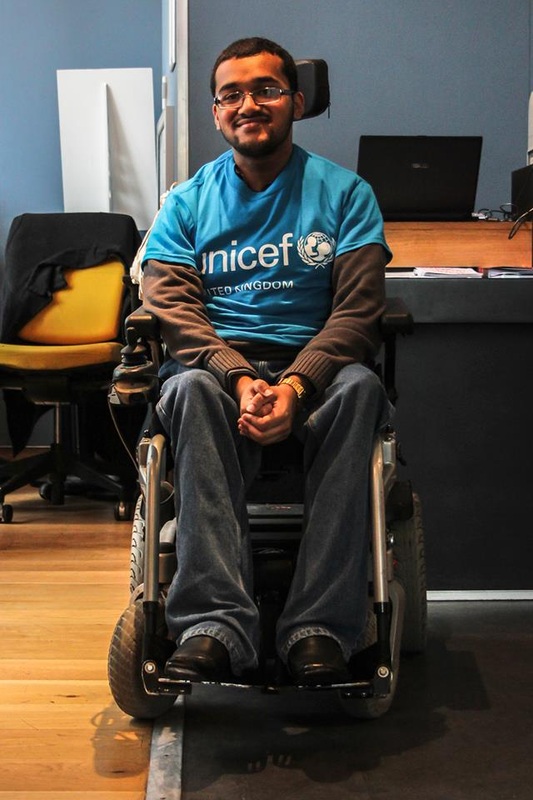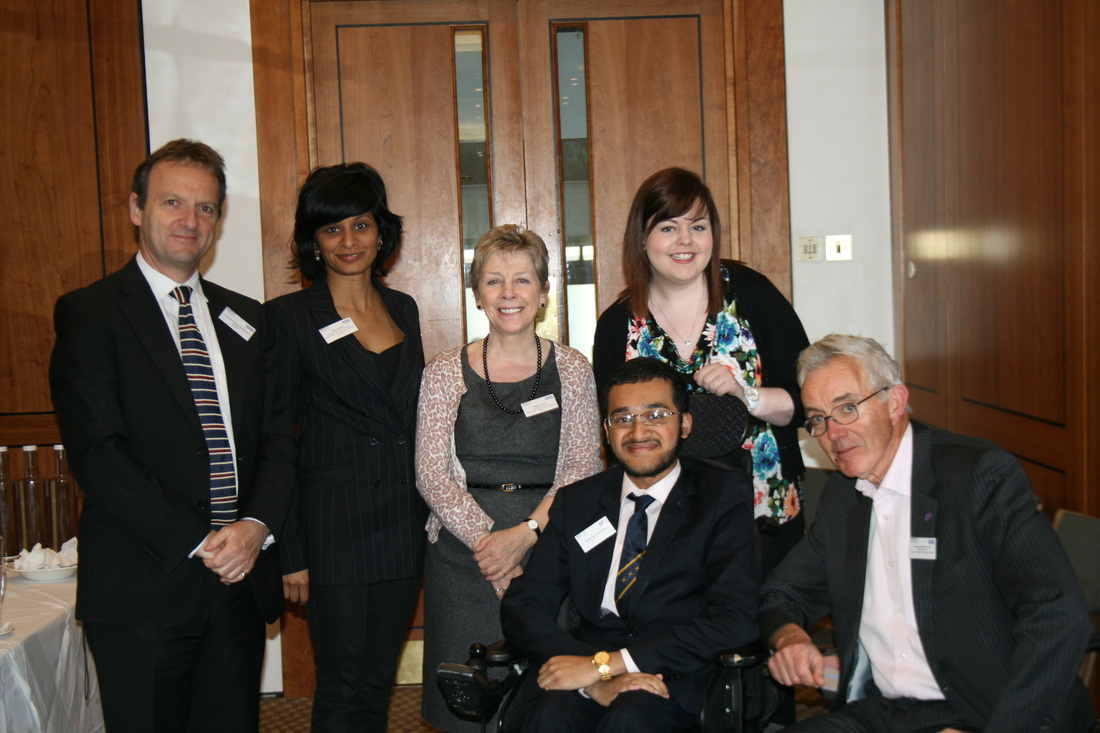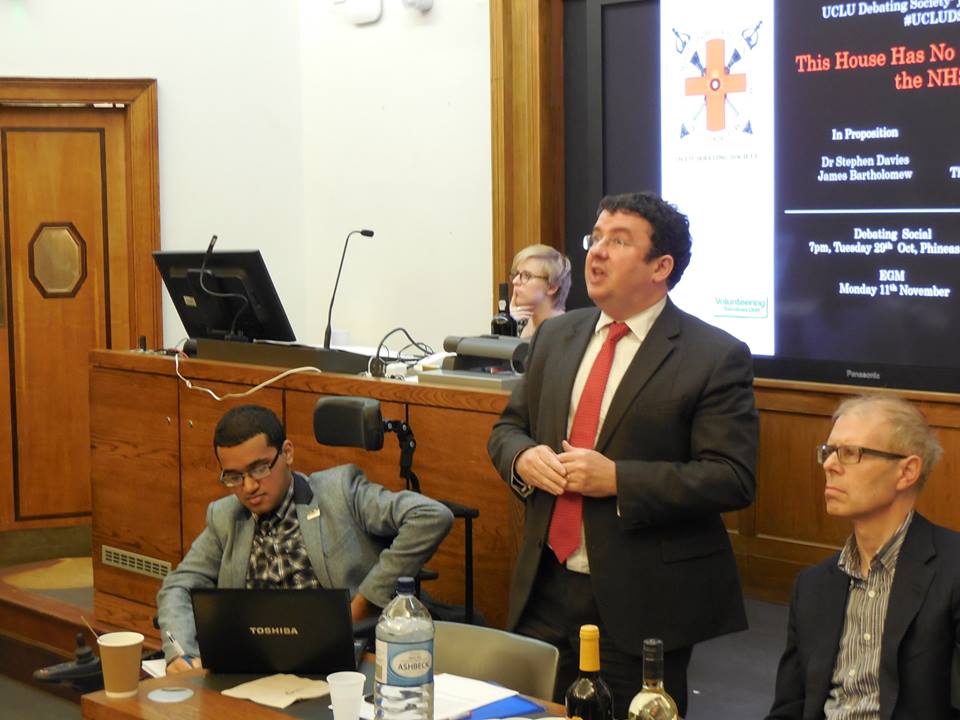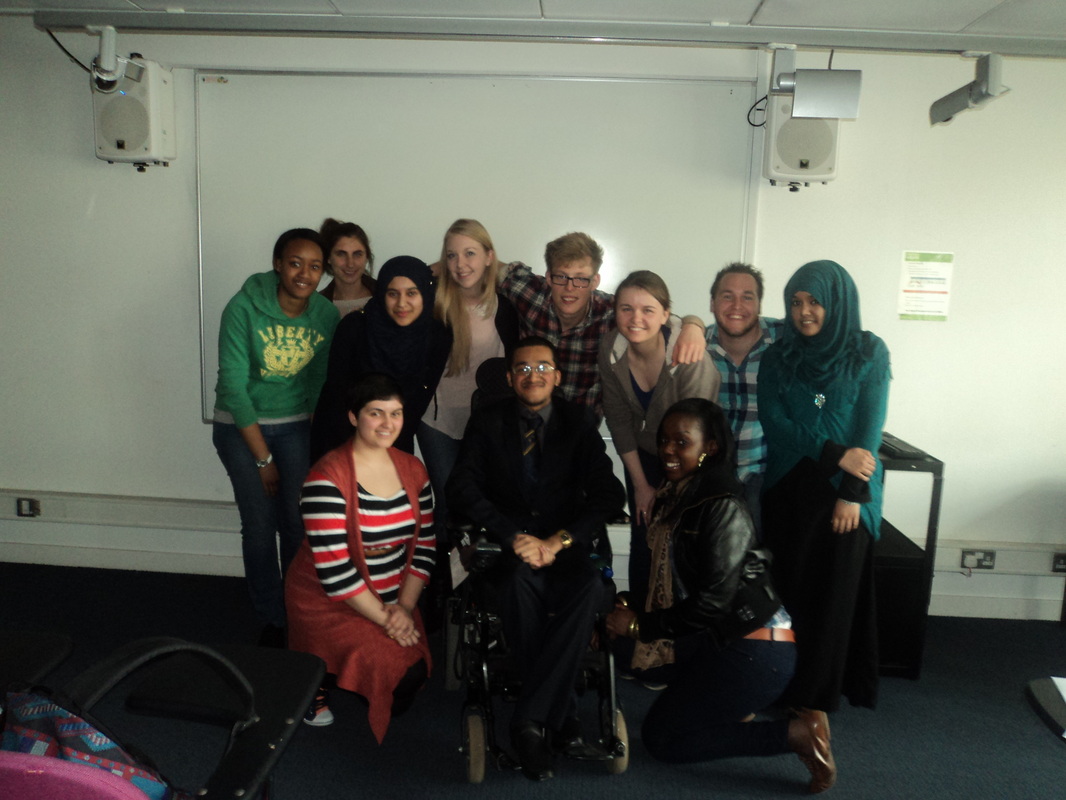|
The 29th April - 1st May 2016 Brittle Bones Society VOICE 2016 - A weekend that I will never forget.
It's where I met my Osteogenesis Imperfecta (OI) family (not literally, but you'll get what I mean) for the first time. This has been 22 years in the making but finally I had the opportunity and the courage to meet with others people with OI. It must have been my lucky day because it also happened to be the occasion where the Brittle Bone Society (BBS) teamed up with the Osteogenesis Imperfecta Federation Europe (OIFE) teamed up for the first time to host this event together. And what a weekend it was... partying, sporting and general craziness in one bundle of a weekend!
43 Comments
Between the 15th – 17th May 2015 Chloe Hixson (Disabled Students’ Network Committee Member) and I had the pleasure of attending this years’ National Union of Students (NUS) Disabled Students’ Conference in Manchester. It was the first time for us attending a national conference so we were unsure what to expect but excited all the same.
We were placed in the Park Inn Hotel near Manchester Piccadilly station. And both us had to admit the accessibility of this hotel was beyond incredible. Chloe was staying in a standard room and she was fine in the facilities provided. Chloe is a wheelchair user and this stay highlights the pure accessibility of this hotel. Their standard rooms are adequate for individuals with mobility issues. The location of the hotel proved to be ideal. It was very close to the station, as we both found; our taxi rides to the hotel did not cost more than £10. An interesting note about Manchester black cabs, they are just as accessible as London cabs. Compared to my previous bad experiences in Birmingham and its’ black cabs, Manchester seemed to be far more geared up for wheelchair users. On 17th October 2014, I was successfully voted by other self - defining disabled students to represent them as their Disabled Students' Officer to sit within the Union. I am rather honoured to be voted into such a position, of all of the positions I hold (which each mean different things to me), this position holds the most personal relevance to me. I will be an executive part - time officer and will be part of the Union's executive committee as well as responsible convening the Disabled Students within UCLU to hear their views and then take them up to the appropriate level within the union and the university. In my term in office, I will fight for all the things outlined in my manifesto below as well as a few key other things:
These are some of the things I would like to see happen in my term in office, I know with the group of people I have around me to support me, I will do the best I can to achieve all the things outlined above and below :D 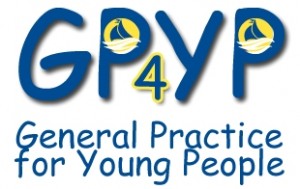 On 5th November 2013, I had the pleasure of being invited by the lovely Kath Evans to speak alongside her at the ‘One Day Essentials: Child Health’ event at the Royal College of General Practitioners (RCGP). During this event I had the pleasure of sharing my experience with regards to GP services, as well as presenting possible solutions to issues that other young people and myself came across when accessing GP services. This blog serves to highlight some of the feedback I shared on the day as well as thoughts and reflections from research I carried out after the event. Children and young people make up at least one in seven users of GP services and therefore it means that these services should take this responsibility seriously and ensure that they listen to and act on the views of children and young people. They should listen especially when what the children and young peopl ahve to say is uncomfortable or challenging. GPs form the basis of a lot of conversation at the RCPCH Youth Advisory Panel (YAP) meetings. We admire GPs for the amount of work they have to do, as well as respect them for the amount of responsibility they have. They act as the main point of contact of care for our parents and families. According to a document produced by the RCGP states the main roles of a GP and they are the following: These services have worked very well, at least in my experience for my parents and their friends. However, for people like myself, GPs can often leave us wanting. It was further concerning to learn in a CYPNow article that “staff in GP, mental health and sexual health services said that they were not always trained to receive and act on complaints made by children and young people.” This is rather a disconcerting matter which I shall try to touch upon later.
The Chief Medical Officers latest report states that all children and young people with long term conditions must have a named GP, but we say it is not just important that we have a named GP, it is more imperative we have an active GP. 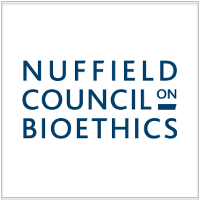 On 30th April 2014 I had the pleasure of being invited to the second stakeholders meeting of the Nuffield Council on Bioethics. It was a pleasure to be invited once again to participate in this workshop/ meeting. The meeting was a fantastic chance to catch up on the progress of the working party group, help feed into their work more as well as a chance to meet more young people and hear their views, thoughts and experiences of research. Furthermore, on a personal note to get to learn more about Medical research involving children and young people, as well as the complex questions and situations which researchers have to deal with. Having been involved in clinical research at a young age and actively trying to get greater involvement of children and young people in research, this project gave me a fantastic opportunity to learn more about how research was conducted in the UK, especially in regards to children and young people. I had the pleasure of attending the very first stakeholders group meeting in July 2013 with several of my RCPCH YAP buddies, and you can read more about our thoughts and experiences from the day on the guest blog post that alongside Ravi and I wrote for the Nuffield Bioethics Blog: http://blog.nuffieldbioethics.org/?p=811 In this post, I hope to highlight some of the key thoughts alongside some of my reflections from the day, with a particular focus of new clinical trials and the role of ethics committees, the topic of 'vulnerability' of children and young people and also the issue of decision making, consent and assent, which seems always to be a contentious point of discussion. The three points which I am highlighting in this blog were the three big questions identified by the working party. 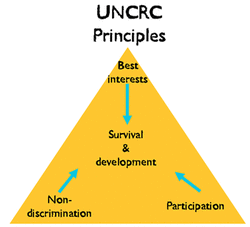 With Universal Children's Day coming up on Thursday November 20th 2014, I thought it would be a good time to reflect on the UNCRC. This will be based on the opportunity I was given to present a session at the Wolfson Centre for UCL students on the BSc module of Global Child Health last year with the RCPCH. The UNCRC stands for the United Nations Convention on the Rights of the Child. The UNCRC is a very important document that was passed by the United Nations (UN) in 1989 and was ratified in the UK in 1991. The UNCRC is made up of 42 articles which outline the civil, political, social, economic and cultural rights of children. These are the rights that every child should have, regardless of where they are in the world. These rights should be met by the governments of every country. The four guiding principles upon which the UNCRC is built are:
Through these guiding principles, the articles form around three different types of rights:
The articles outlined in this convention makes up a huge part of the advocate work I do as part of the RCPCH. To ensure that children and young peoples voices are heard and that they are allowed to take part in all aspects of their life, when safe to do so, and to ensure that children's rights are not being disregarded and ensure their voices are on the agenda for everyone who comes into contact with children and young people. The UNCRC advocates on all principles of life of a child, but for this instance I will be paying particular interest to the articles within the convention which relates to health, as these are the ones in which I work the most with. However, all the articles are very important and should be taken into consideration by all, you can find a link to the whole convention at the bottom of this post. 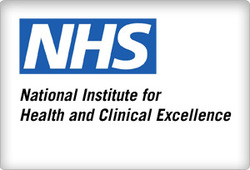 In May of 2014 I was given the pleasure to be appointed as one of the patient and service user representatives for the Guideline Development Group for the National Institute of Health and Clinical Excellence as part of the Social Care Institute for Excellence. I am part of the Guidelines Development Group (GDG) for the Transition from Childrens' To Adult Services project. This is something which I am very excited to be a part of . As someone who has been through transition and has had both positive and negative experiences, I hope that my input will be useful when coming up with these guidelines. More information and updates about this project can be found on the NICE website, there you will also be able to find the scope for the guidelines as well as other key information if you are interested in finding out more. http://www.nice.org.uk/Guidance/InDevelopment/GID-TRANSITIONCHILDRENSADULTSSERVICES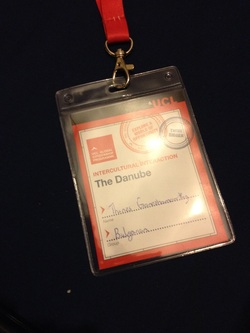 Здравейте (Hello) everyone! In my last two weeks of my first year at UCL I had the chance to take part in the first year program of the UCL Global Citizenship Program. This was something which I signed up for close to the beginning of the new year and went into without really knowing what to expect. The UCL website described the focus of the program as "The first year courses focus on the UCL Grand Challenges – enabling students to tackle the same key global questions as UCL’s world-leading researchers. The courses are specially designed to be multidisciplinary, accessible and enjoyable." Within the program I was able to pick a strand on which to focus on, the strands which were available were:
I chose to follow the inter - cultural interactions stream, which had a particular focus on The Danube. "The Danube is one of Europe’s major rivers, passing through 10 countries as it flows from Germany to Romania. It is both a barrier and a bridge to cooperation, a cause and a cure for conflict: this course will explore both sides of the river’s role in bringing cultures together and keeping them apart, through history, politics, environmental science and literature. Students will also have the opportunity to undertake taster lessons in one of six Danubian languages." I had the opportunity to learn about the language and culture of Bulgaria. I will be sharing my experiences below. At The Big Discussion which was hosted on the 16th April 2014, which you can read more about here: http://thinesganeshamoorthy.weebly.com/blog/the-big-discussion-joining-the-voices-of-young-people-and-healthcare-professionals , we had the pleasure of The Reporters Academy come in to film the event. I am proud to be able to showcase our key priorities which were identified for the event and some key messages from our key note speakers.
On the back of my successful fundraising campaign I decided it would be a good time to share my whole experience regarding my (financial) transition to University. While I have mentioned parts of it during the fundraising campaign, I feel the time is right to share all, the good and the bad. As you all know I have Osteogenesis Imperfecta, and that means I am very prone to spontaneous fractures, also as I am wheelchair bound and not very physically active meaning that I am more prone to chest infections. As a result of these conditions, I require full time support and assistance to help me live out my life in as close to typical student as possible and to ensure my disability doesn't get in the way of my life. My experience of coming to university on the whole has been a largely positive one with my first year being the best possible year of my life, I have become more social, more active within the University and within the wider community and have managed to expand my horizons much more than I would have ever thought and I have been the happiest I've been in a while. However, over the year there has been a grey cloud hanging over me constantly, that of finance. Finance is something that is essential for anything you attempt in life, and as I've found out it is pivotal in university. I am so grateful for the support that the University has given me as well as the local authority but I feel more could be being done to help students in a similar position to my own.
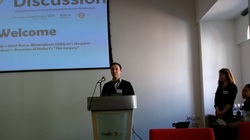 After a year in the planning and organising by the children and young people of the Birmingham Children Hospital (BCH) Young People Advisory Panel, Royal College of Paediatrics and Child Health Youth Advisory Panel and National Children's Bureau and the fantastic team of professionals from the three organisations on the 16/04/2014 we hosted 'The Big Discussion'. The Big Discussion started as an idea by Ellie Miler who is a member of the RCPCH YAP and was on the board as a governor for BCH. Her friend and her came up with an idea for a youth led event which bought together the movers and shakers within healthcare and children and young people to talk and to truly discuss what matters to young people. That fantastic seed which Ellie planted but was unable to see through flourished into The Big Discussion. This event was meant to have children and young people at the heart and it truly did, as one of the many tweets we got about the day, one healthcare professional commented that it was refreshing to see healthcare professionals being equalled, if not outnumbered by young people. One each of the tables there was at least one young facilitators and other young people who came as guests. The day was professionally recorded and captured by representatives from The Reporters Academy (@TRAcademy), which is a media production company run by young people, which is very in-keeping with the themes of the day (Very much looking to see the finished product soon). The day was structured as a combination of key note speeches as well as four discussion topics, we as the young people came up with and felt were the most important areas in our healthcare that needed discussing. We were lucky and honoured to have Aled Jones, from BBC Radio 1 hosting and facilitating the day alongside the youth chairs (one from each of the key organisations). The day started off with a welcome from Michelle McLoughlin (Chief Nurse, BCH). She kicked the day off introducing all the key note speakers who would be sharing their insights and be speaking throughout the course of the day. She then handed over to Aled Jones, who took over proceedings with an fantastic flair and energy which lasted all day. He was able to keep the audience entertained, while keeping to time amazingly. 'My Right to the Highest Standard of Health' - RCPCH YAP, PCG and YPHSIG.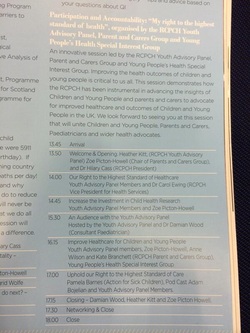 The Royal College of Paediatrics and Child Health hosted their annual conference at the International Convention Centre between 8th - 10th April 2014. I had the pleasure and honour of being invited to speak and attend along with other members of the Youth Advisory Panel (YAP) (Pictured above). We were all delighted to attend as we all believed very strongly in the fact that "No matter how young a child is they have the right to be involved in their treatment". This was one of the key messages we were trying to put out to the audience of paediatricians, researchers, professors and other healthcare professionals and advocates who were present at the conference. Members of the YAP had the utmost honour of opening the very first plenary on Tuesday alongside the College president, Dr Hilary Cass. This was our very first opportunity to get some of our key messages that we wanted to get out during our time at the conference, some of those messages and take away questions that were expertly expressed by our Lisa and Mohini were: 1) Just how good are paediatricians at listening to Children and Young People (CYP)? 2) Encouragement for more collaboration between services, with a particular emphasis being placed on the collaboration between paediatric and adult services during transition. 3) The rights of CYP to be consulted about their treatment, no matter what their age was highlighted. 4) Another key note, was that there was a call put out to have literature that has a focus on how the condition effects us as CYP, "We don't want to know everything" says one of our panel. It has been nearly a year since I got the chance to appear on national television for the first time raising concerns about the true costs of university, especially for disabled students.
I was kindly asked and honoured to be part of organising a youth conference as a chance for young people to have a platform to discuss issues and topics which matter to them and really think that healthcare professionals need to concentrate on. This process took a year for the event to come to fruition, but after much hard work of all parties involved, we are so delighted this event is going ahead. I personally look forward to this event happening and I am honoured to be a part of this youth movement to affect change for the better. #YoungPeopleMakingWaves
Here is a short blurb prepared for the event: This one day conference (10am-4pm) on April 16th 2014 has been instigated and organised by youth members from Birmingham Children’s Hospital, Royal College of Paediatrics & Child Health and the National Children’s Bureau. The event will be hosted by special guest Aled Jones from Radio 1’s The Surgery and is supported by Healthwatch Birmingham. The aim of the day is to bring young people and healthcare professionals together to discuss issues that are important to young people. There will be a variety ofdiscussions and Q&A sessions based around our 4 key themes: Mental Health, Signposting and Transition, Communication and Health Education. This is a fantastic opportunity for shared learning that we hope will bring about real change. For more news and updates about the event follow @TheBigDiscuss On 20 March 2014 the BPSU, in collaboration with Rare Disease UK and the RCPCH Youth Advisory Panel, held an event to mark Rare Disease day 2014 and the UK plan for implementing the UK strategy for rare disease. Over 100 people attended the event including patients and carers, healthcare professionals, researchers and policy-makers. All were united by the theme of the day ‘Joining together for better care’. A podcast was unveiled by the Youth Advisory Panel on living with a rare disease. I was a part of this podcast and I talk about what my experience is like as a disabled individual.
I have experience of being involved in a research trial. We have captured my thoughts and experiences in this short podcast which also sets out some recommendations from the RCPCH Youth Advisory Panel in involving children and young people in clinical research.
On the 6th February 2014, I had the pleasure to host the first inaugural Masquerade Ball organised by the SSEES Committee. I, as the welfare officer, had the privilege to pick the charity which we would be supporting as this would be a charity Masquerade ball. I chose to support the Brittle Bone Society. They fundraise for specialised wheelchairs and offer a free confidential support service as well as signposting on day to day issues such as benefits and treatments. This event had a lot of stress to organise, including trying to make the club more disabled friendly. However, we all pulled together as a committee and we pulled it off. We are proud to announce that we raised £2622.02 for the Brittle Bone Society, thanks to the generosity of the students of UCL and their friends. We are looking forward to the ball next year. We are delighted to be also featured in the winter newsletter for the Brittle Bone Society, an excerpt of which can be found below: For more information about the Brittle Bone Society and the work they do please visit: http://www.brittlebone.org/
On 5 February 2014, I was asked to present a young persons response to the call put out by the NIHR (National Institute for Health Research). This call was asking research to commit to more research into the area of long term conditions in children and young people. This presentation was given in front of many health care professionals and researchers, key stakeholders in this call. I was very proud to be able to present a variation of my turning the tide speech at this event.
On 28 November 2013, I was elected the Marketing officer for the UCLU UNICEF on Campus society. The day after, on a fundraising drive to raise support for a Fun Run UNICEF on campus was organising, I was interviewed by the genius and creator of Humans of UCL, the interview is below:
“I have a medical condition known as Osteogenesis Imperfecta. It’s more commonly known as ‘brittle bone disease’. Essentially the proteins that comprise my bones are formed imperfectly, so the bones form in a raggedy fashion and that means they can snap very easily. I’m the first in my family to have it so it’s difficult to deal with. It’s also a very rare condition, especially in the UK, so it’s very hard to get advice about it.” “Has your disability impacted you to be the person you are?” “If I didn’t have a disability I wouldn’t be the person I am now. It’s driven me to be successful and to be motivated and to not give up. Because it’s so easy to give up with a disability, especially when you’re in the hospital and you live a shit life. But I think I’ve used it to my advantage to try and motivate myself to be more determined to be the best I can be.” At this point his friend noted that he was the marketing officer for UNICEF on Campus, among other things. So I asked: “What are you involved in now?” “I’m the marketing officer for UNICEF on Campus, and I’m also the SSEES Committee welfare officer, and I’m a member of the Youth Advisory Panel for the Royal College of Paediatrics and Child Health – I advise the UK government on healthcare policies involving children and young people. I administer and do talks across the country, advocating the voices of young people, which are voices that aren’t often heard. And I lecture at King’s College and Greenwich University to medical and nursing students, teaching them about how to best manage long-term medical conditions. Lastly, I teach people conversational English at the language centre.” “And what do you study?” “I’m a first-year BA Politics and East European Studies student – I’m 19.” NHS London Tertiary Paediatrics ProjectMy first event with the RCPCH YAP was on Monday 23rd April 2012, which is nearly 2 years ago now. I wasn't aware when I first got invited to take part in this event that I would join the YAP at the RCPCH. In an interview which I gave after this event I said the following:
"I was so excited about attending the event, it was great to meet other people and hear their experiences as I don’t get to do it very often. It’s was positive to hear everything that’s going to be done to improve paediatric services and I look forward to seeing how our ideas." http://www.rcpch.ac.uk/news/rcpch-young-spokesperson-comments-childrens-services and comments shape the service Some of our ideas included: • Visiting patients, parents and carers locally to support their engagement in the project • Creating on line webinars and forums to enable patient and carer input & communications about the project development • Listening to their input and providing feedback. During my first term at UCL I had the pleasure of being the opposition speaker for the motion 'This House has no confidence in the NHS'. Having been in and out of the NHS system throughout my entire life, I have a lot of trust and confidence in the NHS and I was adamant to speak in opposition to this motion. I was lucky enough to be given this opportunity by the oldest and most prestigious society at UCL, The Debating Society. A report written by my friend, can be found below. It was published in Pi Media, which is a magazine for UCL. http://www.pimedia.org.uk/this-house-has-no-confidence-in-the-nhs For some of the arguments used by my partner, Chris Hopson: chief executive of the Foundation Trust Network, and I please refer the document below:
I thought my first post should be one explaining more about me and what my medical condition in. In order to illustrate this better I shall be utilising a Youtube recording of a presentation I gave at King's College London in the Summer of 2013. It was the summation of my AQA extended project which I did as part of my A Levels and the question I answered was "Will there ever be a cure for Osteogenesis Imperfecta?" Please click below for a copy of my report:
Since I was 17, I have been given the honour and absolute pleasure of speaking in front of the future nurses and medical professional of the UK. I have been given multiple chances at Greenwich University and Kings College to speak to their students on the topic of Osteogenesis Imperfecta as well as given tips and advice from a service users perspective on how we as children and young people would like to be treated. Attached below are transcripts of the speech I deliver along with the slides that I use.
|
|||||||||||||||||||||||||

